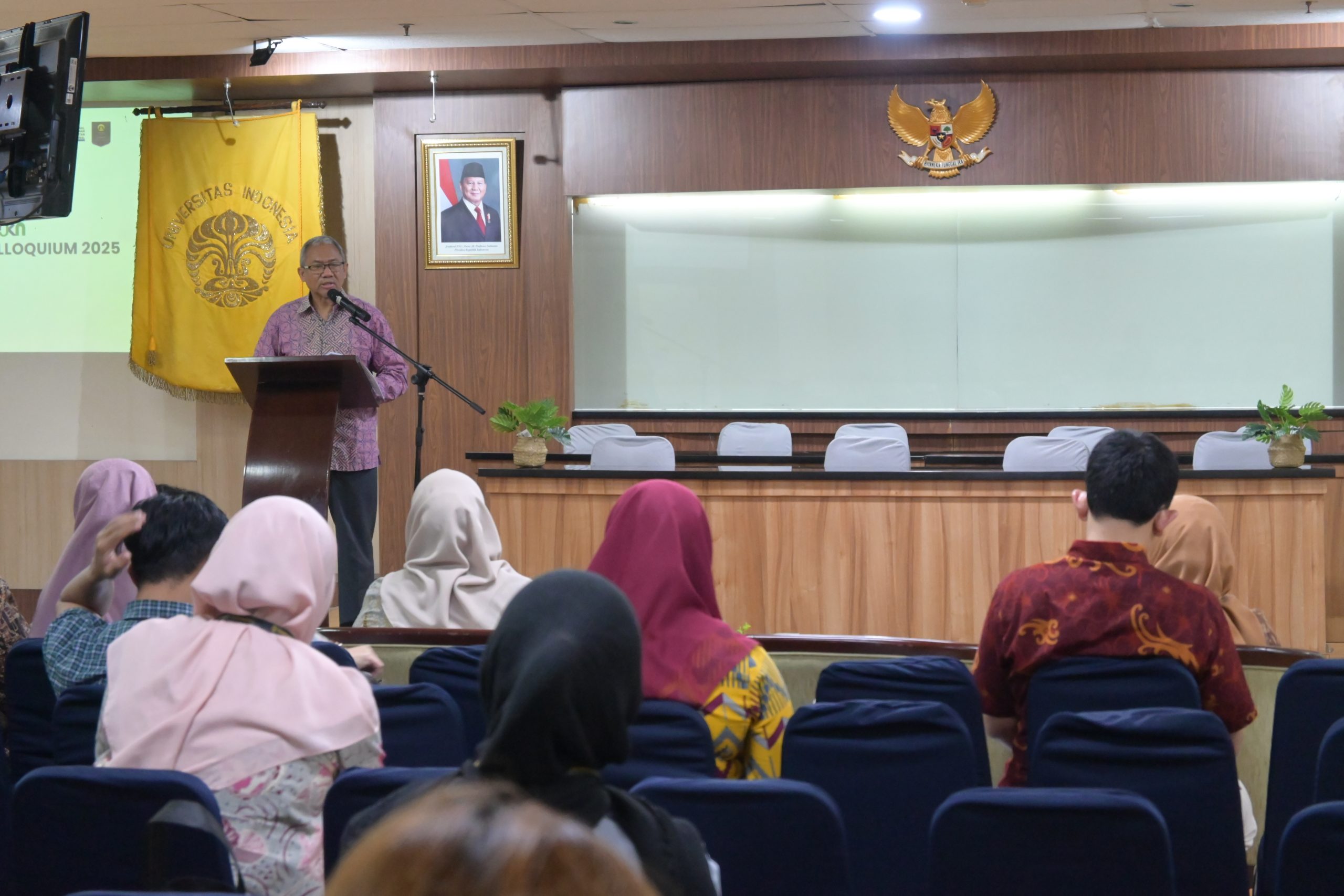Depok, July 16, 2025 — The Faculty of Public Health (FPH) Universitas Indonesia (UI) reaffirmed its commitment to strengthening scientific literature in the field of public health through the organization of the Public Health Colloquium 2025: Public Exposé of the JKN Journal. In collaboration with BPJS Kesehatan, this event served as a strategic platform for academics and researchers to directly contribute to the enhancement of the National Health Insurance (JKN) system through evidence-based research.
With a theme focused on national health insurance systems and current public health issues, a total of 46 scientific manuscripts were submitted by researchers from across Indonesia. After a rigorous selection process, 23 of the best manuscripts were invited to the Doctoral Promotion Room at FPH UI’s Building G, where participants received direct mentoring from experts and were given the opportunity to publish in nationally and internationally accredited journals — Jurnal JKN (SINTA-4, DOAJ) and Kesmas: National Public Health Journal (Scopus, SINTA-1).
The event was officially opened by Prof. Dr. Mondastri Korib Sudaryo, M.S., D.Sc., Dean of FPH UI. In her remarks, Prof. Mondastri expressed appreciation for the strategic collaboration between FPH UI, BPJS Kesehatan, and the two scientific journals. “We are deeply grateful to Prof. Dewi, Editor-in-Chief of Kesmas Journal, and Ms. Lisa from BPJS Kesehatan for initiating this activity. The Public Health Colloquium is a regular FPH UI agenda, but this year it feels special because of the collaboration with BPJS and the JKN Journal,” Prof. Mondastri stated.
She also emphasized the importance of sustaining such collaborations to reach a broader academic community from regions including Malang, Banyuwangi, Samarinda, and Bandar Lampung. “This journal collaboration is highly strategic. The struggle to improve journal accreditation is just as challenging as maintaining its quality. Therefore, this synergy is crucial to enrich scientific discourse and expand the influence of research on policy,” she added. Prof. Mondastri expressed hope that this initiative would go beyond manuscript selection and mentoring, becoming the foundation for broader and more sustainable collaboration to strengthen Indonesia’s academic climate, particularly in research and publication.
Lisa Nurena, S.E., CHIA, Head of BPJS Kesehatan Corporate University and Editor-in-Chief of JKN Journal, also delivered a speech during the event. She highlighted the importance of scientific innovation in addressing increasingly complex and dynamic health challenges. “BPJS Kesehatan is required not only to provide effective and efficient services but also to base its efforts on solid data and scientific evidence,” Lisa said. She stressed that such evidence is vital in program evaluation, monitoring healthcare service trends, and identifying system gaps. Hence, collaboration with academics and researchers is critical in building a productive research ecosystem that contributes meaningfully to policy development.
“This partnership reflects BPJS’s openness to the academic world. It is an important step toward building public accountability and increasing public trust in the JKN system,” Lisa added. Since its first issue in 2021, the JKN Journal has published 78 scientific articles and is currently accredited as a SINTA-4 journal. Lisa expressed her hope that the journal would soon be indexed internationally. “We hope the Public Health Colloquium 2025 becomes a reflective forum that strengthens our collective commitment to a just health system,” she concluded.
The spirit of academic collaboration was echoed by Prof. Dr. Dra. Dewi Susanna, M.S., Editor-in-Chief of Kesmas Journal. “This collaboration is important not only as a scientific forum but also because of its significant impact on the advancement of public health knowledge, particularly in social health insurance,” she said. She also noted that Kesmas Journal has been indexed in Scopus since 2016 and continuously strives to maintain international quality standards. According to her, the presence of experienced facilitators and selected participants would greatly enhance the quality of publications. “With these 23 top manuscripts, I am confident we can produce strong and impactful scientific contributions,” Prof. Dewi concluded.
As a core part of the event, the 23 selected participants engaged in intensive coaching sessions divided into 8 groups, each mentored by experienced facilitators in public health and scientific writing. Facilitators included Prof. Dr. Dra. Dewi Susanna, M.S.; Lisa Nurena, S.E., CHIA; Rizka Maulida, S.K.M., M.HSc., Ph.D.; Prof. Dr. Dra. Dumilah Ayuningtyas, M.A.R.S.; Prof. Dr. Drs. Tris Eryando, M.A.; Prof. Dr. Hadi Pratomo, M.P.H., Dr.PH.; Dr. Pujiyanto, S.K.M., M.Kes.; Dr.rer.medic. drg. Dwi Gayatri, M.P.H.; and Dr. Puput Oktamianti, S.K.M., M.M.
During these sessions, participants received hands-on guidance in refining the structure, methodology, and scientific contribution of their manuscripts to prepare them for journal publication. As the final segment of the series, FPH UI hosted the 2025 National Health Seminar on July 17, 2025, at Balai Purnomo Prawiro, Universitas Indonesia. The seminar served as a crucial venue to disseminate recent research findings and to connect academics, practitioners, and policymakers in shaping a more equitable, evidence-based health development agenda.
Public Health Colloquium 2025 was more than a scientific forum—it was a collective movement to bridge the academic and policy worlds. Amid the complexity of the national health system, this event proved that research and scientific writing hold immense power to drive transformation. Through close collaboration between universities, government institutions, and academic journals, FPH UI and BPJS Kesehatan are sowing the seeds of a more transparent, just, and sustainable health ecosystem. (DFD)

